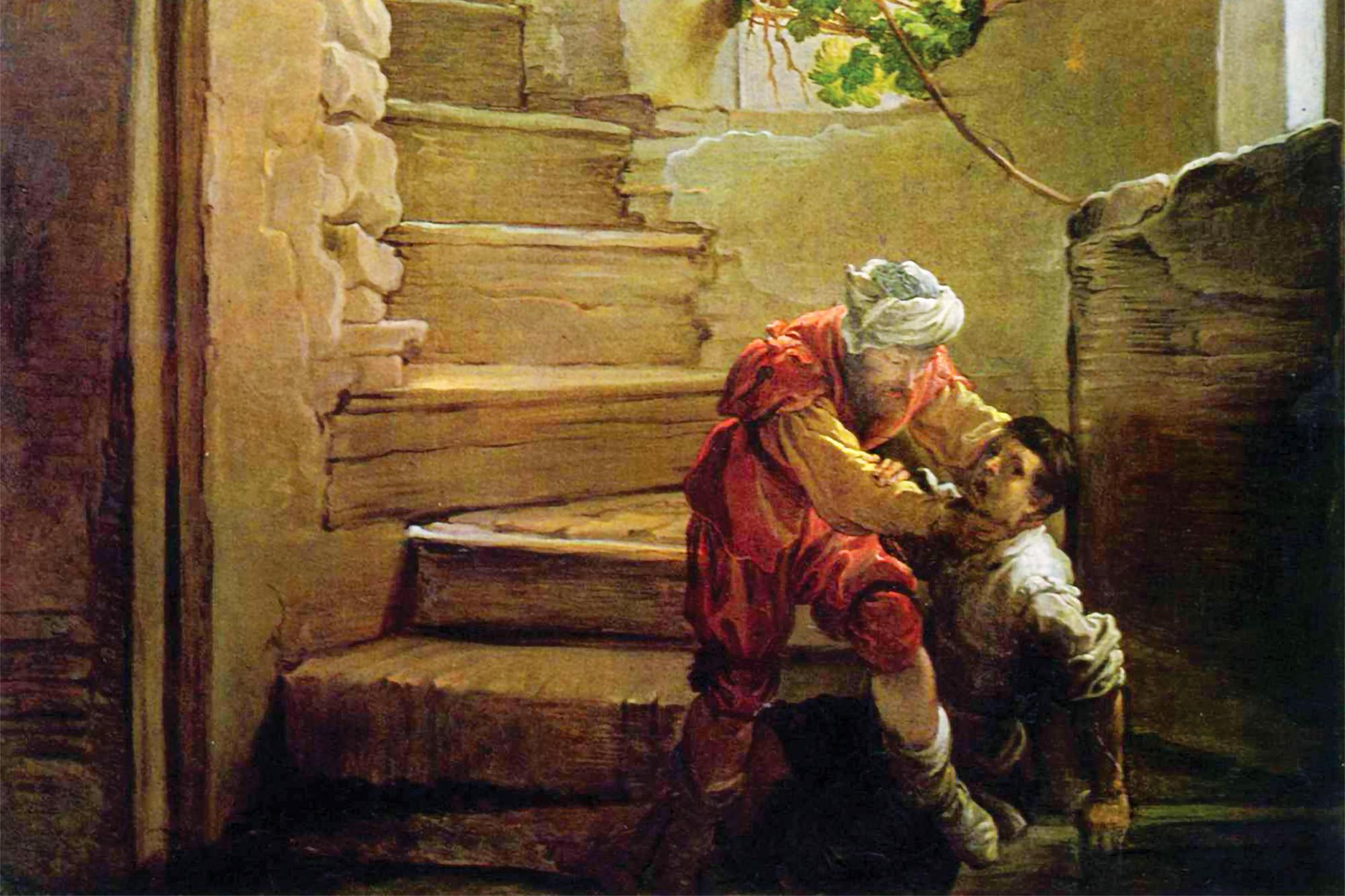
Jesus' instructions continue:

Our Gospel lesson this morning is brief and comes to us in the form of instructions .... as they proceed from God, let us call them Divine commands:
|
Love your enemies.
Do good to evil or selfish people. Lend money to corrupt men. Most important, hope for nothing in return: neither decent affection nor civility, much less repayment of loans. |
We bridle at these words as we picture this playing out in practical terms: kowtowing before thugs who exalt in bullying the weak, happily giving our money to swindlers who steal from the elderly and confused, affirming sexual predators who destroy our sons and daughters.
Yet, when we hear someone say, "That's the sort only a mother could love," this Gospel lesson begins to come into focus. We ask ourselves, "Who is it is kind to the unthankful and the selfish?" We know this love. Is not this the one we know best? The one we knew first? Is it not one's own mother and father? And do we not also believe that we are deserving of this unconditional love (in our selfishness) .... because these are our parents?
What only a moment ago seemed so alien, even impossible to understand, suddenly becomes familiar (that word having to do with family) .... most familiar. Why, this love is the bedrock and foundation of our emotional life and development.
And we see it displayed all around us, commonly. Which teenagers are not abusive to their parents? Who else would tolerate such insult and insolence? Yes, on reflection we see that these instructions from God are not strange at all, but rather the opposite of strange: family.
So familiar is this love that we say it is an archetype. the parent-to-children relationship, which we find in roughly the same form the world over, in every culture. Indeed, the Parable of the Prodigal Son, which Jesus tells His Disciples, suggests that we also find it repeated again and again over a span of thousands of years. ..... and much longer than that as we read the Book of Genesis.
We should note in passing that this parable of the unruly son abusing his long-suffering father is found uniquely in the Gospel of St. Luke. As we shall see, it is a theme that echoes through Luke's Gospel.
So, let us return to our epigram. Is God commanding us to go into the world serving ourselves up as gullible Pollyannas, or, worse, willing victims of serial abusers? If that is true across the board — that God wishes us to be a pigeon to every con man or a laughing stock in every circle of acqaintance — then we face a grave problem, for these commands simply do not square with the practical instructions sternly administered by Jesus as He sends out the Seventy, which is also found in St. Luke's Gospel. The Master says,
| "Salute no man by the way." (Lu 10:4) |
"What's that?" you can picture these Seventy saying to each other. "Did the Master just tell us to salute no one? That we mustn't nod or smile to anyone? .... even those who have just waved at or smiled to us? That we ignore all people as we walk down the street?!"
These grave men must have cut a flinty figure as they entered every town: eyes straight ahead, never veering from their most serious mission.

Jesus' instructions continue:
| "Behold, I send you forth as lambs among wolves." (Lu 10:3) |
Among wolves? No wonder they "carry neither purse, nor scrip, nor shoes" (Lu 10:4). They are apt to be surrounded by highway robbers (as anyone in those days would have been), so they carry nothing that can be stolen.
And when they should encounter inhospitable people, the Lord Jesus instructs them to
|
"go out into its streets and say, 'The very dust of your city which clings
to us we wipe off against you.'" (Lu 10:10-11) |
He adds as an epilogue,
|
I say to you that it will be more tolerable in that Day [of Judgment]
for Sodom than for that city. (Lu 10:12) |
How do these things square with "love your enemy" and "do good to evil people"? You see, it all depends on context. In the former case, Jesus envisions the conduct of people within His Kingdom on Earth, which He will gather into His Church, who will be citizens of the Kingdom of God in Heaven.
We find the same distinction in the Letters of St. John or in the Pauline Correspondence: give a wide berth to worldly people, but toward your brothers and sisters in Christ, offer your love:
|
Love suffers long and is kind; love does not envy; love does not parade itself, is not puffed up;
does not behave rudely, does not seek its own, is not provoked, thinks no evil;
does not rejoice in iniquity, but rejoices in the truth;
bears all things, believes all things, hopes all things, endures all things.
Love never fails. (1 Cor 13:4-8) |
Can we not sum up this mind and soul with a single phrase? This is "family love" .... "family life." And I might add that 1 Cor 13 is unfailingly read at every institution of family in sacramental Christian marriage.
Yet, with those who have canceled their adoption by God our Father, even abusing their siblings who still love Him, the case is a different one. Such can no longer expect the long-suffering love which Jesus counsels. Indeed, it shall be more tolerable in the Final Judgment for Sodomites (who also rejected God's ways) than for these rebellious children of God. In a word, they are no longer family.
And should I mention the "Sons of God," suffering in Perdition, fallen from His grace?
Peter asks Jesus,
| "Lord, how often shall my brother sin against me, and I forgive him? Up to seven times?" (Mt 18:21-22) |
"How long must I endure my brother's sin," Peter asks. And Jesus famously replies,
| "I do not say to you, up to seven times, but up to seventy times seven." |
If the one who sins against you is your brother (or sister), then love can never fail ("seventy times seven" equates to infinity). Do you see the enclosed circle? Where the subject is love among brothers, then fraternal humility must surely follow: the brother humbling himself in begging forgiveness and his sibling humbling himself, granting it however much he has been abused.
"Let's put the past in the past. Come, brother." [Embrace]
Yet, the one who pridefully parts ways with his brother, cutting family ties .... from such a man as this no forgiveness will be sought. And his sibling is not bound to run after him granting forgiveness willy-nilly, .... chasing him down the road, saying "I forgive you! I forgive you!" as his brother returns an indecent gesture. No. That is not Christian life.
Consider the prodigal and his father. Yes, the father waits at the roadside watching for this son's contrition and humble request for pardon. But we do not see the father pursuing the son .... in brothels or bar rooms or gambling dens. No. To the one who does not seek forgiveness, no forgiveness will be shown.

To Peter, who inquires about forgiveness,
Jesus explains (Mt 18:21-35),
|
"Therefore the Kingdom of Heaven is like a certain King who wanted to
settle accounts with his servants." |
To the servant who is faithful to the Kingdom, the King displays infinite patience and mercy. But to the one who betrays the merciful Kingdom, the King
| delivered him to the torturers until he should pay all that was due .... (Mt 18:34) |
To the King's faithful subjects, indefinite mercy will be shown. Seventy times seven! For His is the Kingdom of Mercy. And the Kingdom of Mercy should forswear itself if it be not merciful. But to those who have nullified their citizenship in this wonderful Kingdom, justice is meted out. Fairness is given .... what is "due." You know this difference between fair and merciful? Let us admit this: mercy is not fair. It is desired. It is most desired. But it is the opposite of fair. Fair is defined as "that which is due." And, of course, we have heard the Master's teaching on this topic: those who forgo mercy will then receive no mercy, but justice only.
We know very well the answer to Cain's question, "Am I my brother's keeper?" (Gen 4:9). The answer is, "Yes, and till the end." My brother's keeper. The story of Cain, of course, is the Ur-story of one who parts company with God: the first human rebellion East of Eden.
As we have said, the theme of family life echoes through St. Luke's Gospel. He sounds these tones as the Gospel opens regaling us with family stories: of Zechariah and his son, John the Baptist, of his mother Elizabeth and her sister Anna, of Anna's daughter Mary and her Jesus, Son of the Most High God, Who by that fact, is family to all these people. He is family! You might expect Him at any family reunion!
Throughout Luke's Gospel, Jesus emphasizes the importance of family connections, which He defines in terms of the Kingdom of God. When a woman calls out to Jesus,
| "Blessed is the womb that bore you!" (Lu 11:27) |
Jesus replies,
| "Blessed are they that hear the word of God, and keep it!" (Lu 11:28) |
As Cain will discover, simply being "blood family" will not be enough. The Kingdom of Mercy, the Kingdom of God, is an affair of the heart. This is family: that they all be One with the Son and the Father, even as the Father is perfectly united to His Son (Jn 17:22).
My brothers and sisters, The spiritual journey is a long one. It winds through the darkness of woods and down long, lonely valleys. It exposes us to sorest trials and temptations and to the depths of self-sacrifice and self-denial. During the present historical era, even the most basic properties of mind and soul, even identity, can no longer be trusted .... as our children are compelled to question that most basic aspect of their being — even whether a boy may safely term himself a boy or a girl may safely think of herself as being a girl — without being badgered by the authority figures around them. Truly, these are dangerous times. And confusion is no longer the exception, but rather the rule. And I counsel you to be cautious with this command, "Love your enemies," lest you willy-nilly chase Christ-haters down the road affirming them all as so many religious are wont to do. Remember the Lord Jesus when He said, "Family — the ones who love God and do His commandments." Only these are family.
Withal, God has fashioned a Kingdom that is present to us even through the darkest gloom and midst the greatest perils. And in the dust of confusion, we recognize the merciful King and His faithful subjects exhibiting the first love we ever heard, coo-ed to us by our parents, softy falling like graces into our cradles. And the rest does not really have to be explained to us. For we know its unmistakable hallmark:
| "He is kind to the unthankful and the selfish." |
Who else could this be but our mother-and-father? Who else is unfailing in patience and understanding and love .... even in the face of chronic abuse? This must be family, therefore! And from this most precious formation, the Lord Jesus says to us,
| Be sons and daughters of the Most High. |